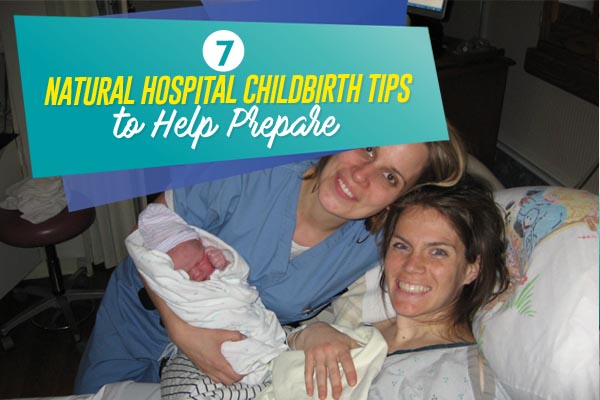
You’re planning a natural childbirth in a hospital setting and want to do all that you can to prepare for the big day. Here are 7 natural hospital childbirth tips to help you prepare.
Estimated reading time: 5 minutes
The national average for cesarean birth is 32% (1). Yet, cesarean rates can vary widely from hospital to hospital. This suggests that hospital policy or procedures might place a healthy, low-risk woman at a greater risk for interventions than she would be at a different hospital. Contact your state’s department of health to view data about the cesarean section birth rates at each of your local hospitals. As you do your homework, you’re setting yourself up for the best chance for a successful natural birth.
Most doctors and midwives are going to be on board with your plans for a natural birth. But some providers are much more experienced at helping moms have a low-intervention birth than others. Find a doctor or midwife whose practices and policies support low-intervention, spontaneous (starts on its own) vaginal birth. Interview several providers or practices before you make your final decision to be sure they’re a good fit for your birth philosophy.
In a hospital setting, the majority of women use epidural medication during labor — around 63% of first-time moms (2). Your planned natural birth is a deviation from the “norm” that most doctors or midwives are used to. In order for your provider to support your plans for a natural birth, you need to clearly let him or her know what type of birth experience you want. Your monthly or bi-weekly prenatal visits are the ideal time to discuss your plans for a natural childbirth. Start early and build a positive relationship with your doctor or midwife. Talk, ask questions, and of course, listen.
When your goal is a natural birth in a hospital, participate in a childbirth class that promotes a positive view on birth in a hospital and a positive view on doctors. Be sure that your class discusses the pros and cons of common hospital-based interventions using evidence rather than opinion. This type of childbirth class will increase your knowledge and, ultimately, your ability to advocate for a natural hospital birth.
To experience a calm and confident natural childbirth, you should plan to use a wide variety of non-medicinal labor coping tools. Deep relaxation, breathing techniques, positioning, and massage are just a few of the tools that you can use to cope well with labor contractions. Many of these techniques, especially relaxation and breathing techniques, require consistent practice during your pregnancy. Prepare yourself for a positive natural birth by first learning and then practicing a wide variety of labor coping tools.
Your birth plan will be well-received when you write it in a way that speaks to your audience — busy nurses, doctors, and midwives. Try to keep your birth plan to just one page. In doing so, include only the points of care that are most important to you. Be sure to use terms that reflect that you are flexible and well-educated. For example, “Assuming the baby is doing well, I ask for only intermittent fetal monitoring during labor.” This approach is much more likely to be well-received than, “Under no circumstances will I accept continuous fetal monitoring during labor.”
A doula is a trained labor assistant. She can provide emotional and physical support for you and your partner during birth. Studies have found that women who receive continuous, one-on-one support during labor are more likely to have a vaginal birth that starts without intervention. Additionally, they are also less likely to use pain medication in labor and less likely to have a cesarean (3). A doula will work in conjunction with your birth partner (spouse, friend, partner) to help give you the best chance for a safe and positive natural birth.
Kopa Birth’s online birthing classes allow you to prepare for natural childbirth in the comfort of your own home, 24/7. Enroll today in our free online childbirth class to learn more about preparing for natural childbirth.
References
You’re planning a natural childbirth in a hospital setting and want to do all that you can to prepare for the big day. Here are 7 natural hospital childbirth tips